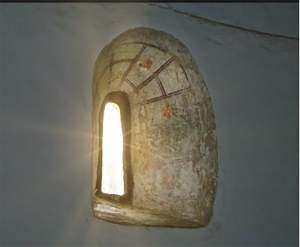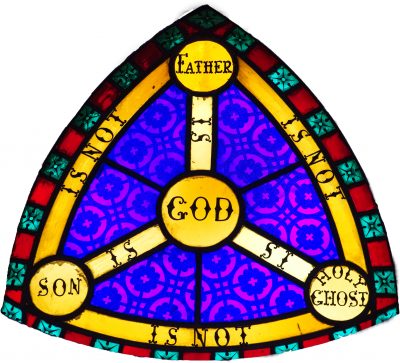 The Cappadocian Fathers were three influential 4th century preachers and writers who helped to formulate the doctrine of the Trinity and who were particularly influential in contributing to our understanding of the Holy Spirit, the Third Person of the Trinity. Basil of Caesarea, Gregory of Nyssa, and Gregory of Nazianzus lived in what is now Turkey, an early site of Christian activity.1 All three Cappadocians were mystical theologians who plumbed the depths of their own spiritual experience, like poets. We will discuss two of them here.
The Cappadocian Fathers were three influential 4th century preachers and writers who helped to formulate the doctrine of the Trinity and who were particularly influential in contributing to our understanding of the Holy Spirit, the Third Person of the Trinity. Basil of Caesarea, Gregory of Nyssa, and Gregory of Nazianzus lived in what is now Turkey, an early site of Christian activity.1 All three Cappadocians were mystical theologians who plumbed the depths of their own spiritual experience, like poets. We will discuss two of them here.
In Treatise on the Holy Spirit, Basil of Caesarea (329-379 A.D.) focuses on Jesus as the Word (Greek: Logos) as described in John’s Gospel, and on the Spirit as divine Breath. The Father is the Origin of all, the Son is the embodied expression and Wisdom (the Word) of the Origin, and the Spirit is the living Truth of the Origin and the Word. Basil believed that the Holy Spirit is continually moving and manifesting among us as a dynamic, eternal relationship of love between the Uncreated and the manifest Word–between the Mystery and the Incarnation.
The Spirit (Hebrew: Ruach and Greek: Haggios Pneuma) is the invisible, subtle Breath or Wind that carries the Word, making the Word visible, audible, and comprehensible to created beings. Although this sacred breath flows silently and invisibly, the Incarnation of the Word in Jesus Christ makes the Spirit visible to everyone. In Jesus’ life we see what the Spirit does, When we accurately and faithfully see Jesus we see both the Creator and the Holy Spirit. Jesus’ infinite generosity invites everyone to enjoy the dance of this sacred Threesome that is a wondrous incarnation of mortality and immortality. The Spirit is a continuous flow of Presence in our awareness. Basil writes,
The Father is the origin of all, the Son realizes, and the Spirit fulfills. Everything subsists by the will of the Father, comes into being through the action of the Son, and reaches its perfection through the action of the Holy Spirit… ‘By the word of the Lord the heavens were made, and all their host by the breath of his mouth’ (Psalm 33.6). This refers… to the Word who was with God in the beginning, who is God. As for ‘the breath of his mouth’, this is ‘the Spirit of truth, who proceeds from the Father’ (John 15.26).
The number three therefore comes to mind: the Lord who commands, the Word who creates, the Breath who confirms. And what can it mean to confirm, if not to make perfect in holiness?2
 For Basil, the Spirit fulfills Christ’s mission, reveals God’s truth, confirms divine revelation, and brings holiness to perfection. Basil also describes the Holy Spirit, the Third Person, as the archetypal Bringer of holy fire, light, wisdom, and healing:
For Basil, the Spirit fulfills Christ’s mission, reveals God’s truth, confirms divine revelation, and brings holiness to perfection. Basil also describes the Holy Spirit, the Third Person, as the archetypal Bringer of holy fire, light, wisdom, and healing:
The coming of Christ? The Spirit precedes it. Christ’s presence in the flesh? The Spirit is inseparable from it. Miracles and gifts of healing? It is the Spirit who bestows them. Demons driven out? In the Spirit of God… Sins forgiven? In the grace of the Spirit, for ‘you were washed, you were sanctified, you were justified in the name of the Lord Jesus Christ and in the Spirit of our God’ (I Corinthians 6.11). Union with God? The Spirit effects it, since ‘God has sent the Spirit of his Son into our hearts, crying ‘Abba! Father!’ (Galatians 4.6). The resurrection of the dead? It is brought about by the Spirit, for ‘when thou sendest forth thy Spirit, they are created; and thou renewest the face of the earth’ (Psalm 104:30).3
Basil’s Cappadocian friend, Gregory of Nyssa (335-395 AD) wrote of the Trinity and the Spirit in this way:
When perfect love has driven out fear, or fear has been transformed into love, then everything that has been saved will be a unity growing together through the one and only Fullness, and everyone will be, in one another, a unity in the perfect Dove, the Holy Spirit… In this way, encircled by the unity of the Holy Spirit as the bond of peace, all will be one body and one spirit… But it would be better to quote the very words of the Gospel literally: ‘That they may all be one; even as thou, Father, art in me and I in thee, that this unity is glory. And that this glory is the Holy Spirit, anyone familiar with Scripture will agree if he is attentive to the word of the Lord: ‘The glory which thou hast given me, I have given to them’ (John 17.22). He has indeed really given them such glory when he said: ‘Receive the Holy Spirit’ (John 20.22).4
1 Basil the Great (330-379) was a Byzantine bishop of Caesarea; Gregory of Nyssa (332-395) was Basil’s younger brother and bishop of Nyssa; Gregory of Nazianzus (329-389), a close friend of the brothers, was Patriarch of Constantinople.
2 Basil of Caesarea, Treatise on the Holy Spirit, 16 (PG 32, I 3 6), quoted in Olivier Clément, The Roots of Christian Mysticism (London: New City, 1993; first published in French as Sources, Editions Stock, 1982), 273.
3 Basil of Caesarea, quoted in Olivier Clément, The Roots of Christian Mysticism (London: New City, 1993; first published in French as Sources, Editions Stock, 1982), 70-71.
4 Gregory of Nyssa, Homilies on the Song of Songs, 15 (PG 44, 1116), quoted in Olivier Clément, 273.